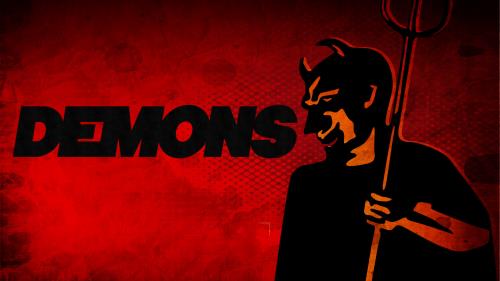-
What The Demons Know Series
Contributed by D Marion Clark on Oct 21, 2012 (message contributor)
Summary: The demons know more clearly than we who Jesus is.
Introduction
Our action-movie director Mark is ready to show Jesus in action. Jesus has proclaimed the good news, called his disciples, and now we are going to see just what this man can do.
The Teacher
The scene begins tamely enough. 21 They went to Capernaum, and when the Sabbath came, Jesus went into the synagogue and began to teach. Typically such preaching, or teaching, was done by a rabbi from the synagogue, but it was not unusual to “give the chair” to a visiting rabbi or dignitary. The speaker read the Scripture standing up, but taught sitting down in the seat known as the Seat of Moses. This same routine is probably taking place in our scene. We don’t know the Scripture read or what he said. All we know is the effect his teaching had on his hearers: 22 The people were amazed at his teaching, because he taught them as one who had authority, not as the teachers of the law.
The people were amazed. It’s a little difficult to understand exactly what the people were feeling. Were they excited? “Wow! This guy is a great teacher!” Or were they taken aback? “Whoa! What’s going on here? Who is he to teach like this?” Positively or negatively, they were shaken up.
Note what it is that shakes them up: because he taught them as one who had authority, not as the teachers of the law. It’s the way he teaches, specifically that he teaches with authority. What does teaching with authority mean?
What it doesn’t mean is teaching with dynamism. Jesus may have been a dynamic speaker, though it is doubtful he would have spoken with a lot of flair in a synagogue setting. Sitting in a chair allows only so much animation.
What the crowd notes is that Jesus spoke not as the teachers of the law. The phrase, teachers of the law is really one word. The King James translates the word as scribes. Scribes were not what we generally associate with the term. They were not mere clerks who copied Scripture and other writings. Scribes were teachers of the Law of God, the rabbis. Scribes were the theological scholars of their day. They were the seminary professors, the interpreters of biblical law who judged court cases. They were the preachers and teachers in the synagogues. My Bible encyclopedia refers to them as “authoritative expositors of the Torah.” Did you catch that word “authoritative”? They were men of authority.
This makes it all the more puzzling as to what is meant by Jesus speaking with authority unlike the teachers of the Law. How did his authority differ from that of the scribes? Matthew’s record of the “Sermon on the Mount” gives us our clue.
21 “You have heard that it was said to the people long ago, ‘Do not murder, and anyone who murders will be subject to judgment.’ 22 But I tell you that…27 “You have heard that it was said, ‘Do not commit adultery.’ 28 But I tell you that…31 “It has been said, ‘Anyone who divorces his wife… 32 But I tell you that…33 “Again, you have heard that it was said to the people long ago, ‘Do not break your oath… 34 But I tell you… 38 “You have heard that it was said, ‘Eye for eye, and tooth for tooth.’ 39 But I tell you…43 “You have heard that it was said, ‘Love your neighbor and hate your enemy.’ 44 But I tell you…”
Did you pick up that recurring phrase – but I tell you? Jesus referred to what was accepted as traditional authoritative teaching and either challenged it or added to it with the only justification that he said so: no quoting other rabbis or even quoting Scripture, which he does other times.
To help you understand better, let me contrast Jesus’ teaching with my own. I teach as a scribe would teach. I possess a measure of authority. I am ordained as a minister to teach and preach Scripture with authority. You are not to regard my preaching as just another opinion being expressed. Rather, you are to receive it as a faithful exposition of God’s Word. That’s authority to a degree. My authority goes only so far as I faithfully interpret God’s revealed Word. If I teach falsely, I can be stripped of my authority. Therefore, I am careful to assert only what I know Scripture to say, and, if I give a questionable interpretation, I quote other “scribes” or other Scripture.
Jesus, on the other hand, if he were standing in this pulpit, would not bother to quote anyone, at least not other scribes. He regarded himself as needing only the authority of God. As he told the people in John 7:16,17: “My teaching is not my own. It comes from him who sent me. 17 If anyone chooses to do God’s will, he will find out whether my teaching comes from God or whether I speak on my own.

 Sermon Central
Sermon Central



